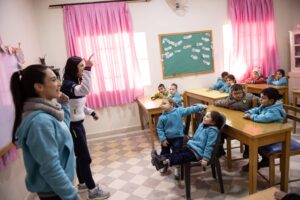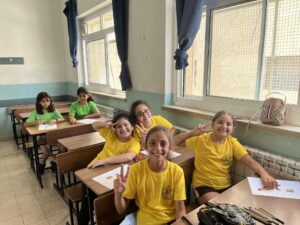- Advocacy
Passing on Hope
Hope is as an “anchor for the soul, firm and secure”. Pope Francis, after “Hebrews 6:19
The major challenge for Catholic schools in the Middle-East
How can we, in a situation of endless conflicts and socio-economic crises, “pass on values of peace, resilience and hope to disoriented youth?” This is the question that thousands of teachers and managers of Christian schools in the Middle East are asking themselves.
If the context is different in Syria, Lebanon, Egypt, Jordan, Iraq or the Holy Land, the challenges are common. The aim is to guarantee access to education of quality, in order to offer prospects to youngsters, whatever are their social conditions or faith, and to involve families in the education of their children. The school is at the heart of these challenges.
Weakened, many of them are exhausted, but keep heading, aware that they are a driving force behind a real living together and a path to possible peace. We cannot let them disappear!
A SCHOOL FOR ALL
An absolute necessity
When money is scarce, school is no longer a priority. In Egypt, many families are turning to governmental institutions, because of a lack of means, or are no longer sending their children to school, says Father Amin Romani, secretary general of Catholic education in Egypt. This is accentuating the difficulties of Catholic schools.
A situation that can be found everywhere in the Middle East, especially in Lebanon. “Supporting our institutions is vital,” says Father Youssef Nasr, secretary general of Catholic education in Lebanon. If they were to disappear, the values they teach, the hope of a peaceful living together, and then the Christians themselves, would disappear with them. This is what L’Œuvre d’Orient has been doing since its creation. Without it, there would be no Christian schools in rural areas.
For young people, Christians and Muslims, who want to rebuild their countries and get involved in society, the education provided by Catholic schools is an undisputed asset. This is all the more true in countries in conflict where the Christian values of benevolence, forgiveness and reconciliation are indispensable for a common social future.
IN THE HOLY LAND
Continuing, whatever the cost
In Jerusalem and the Palestinian Territories,
“maintaining Christian schools is a challenge to guarantee a local presence, to transmit quality of education and instruction, together with the authorized teaching of our religion,” explains Sister Silouane, on behalf of the Catholic schools of Palestine. They try to transmit the values of living together, the richness of diversity, dialogue, mutual respect and sharing. She stresses the importance of “belonging to a school as a second home, a place of serenity and stability in a difficult daily life”. The school is committed to offering keys to “resolving conflicts peacefully, i.e. learning to practice non-violence, finding concrete ways to achieve peace, looking for the right words to avoid confrontation, entering into an attitude of compassion rather than anger because anger is very present in the hearts of Palestinians”.
“Teaching today in the climate that the students have to endure is not easy,” says Sister SIlouane. Conditions have worsened since October 7, 2023. “In concrete terms, students have difficulty getting to school because of the many checkpoints that are built at night: we wake up in the morning, we plan to go to school and, in fact, there is not a single road open. This is disrupting school life. Most of the missile launches take place not far from our schools, which creates a climate of fear and violence.”
In a catastrophic economic situation, because Jerusalem and the Palestinian Territories lived exclusively on tourism that has disappeared, “the parents of our students are unemployed. The atmosphere at home is heavy and no longer facilitates learning at all. Anxious, demoralized parents no longer motivate their children, their concerns are elsewhere and they offload their responsibility for transmitting family values to the school.”
What to do? the Nun wonders. “We are trying to find new ways of teaching, more active, more creative, that would encourage students to believe in a possible future. And yet, for the past two years, students did not hesitate to say to their teachers: “Study why? What is the use? To do what later? We’ve been locked up for years. They don’t see a possible solution. It’s very difficult for us to explain to them that they have to study to build a personality, to get a better job later on, knowing that they see with their parents and family that there is no opening, that there is no work, so why study? ». Giving teachers a breath of fresh air through psychological training and remotivating students through the pedagogy of play are the options that have been put in place in these schools with some success, Sister Silouane is nevertheless feeling cheerful, adding “we try to keep hope thanks to L’Oeuvre d’Orient and the funding of schools of the East which is very important to us.
IN SYRIA
Between worries and hope
“Fr

